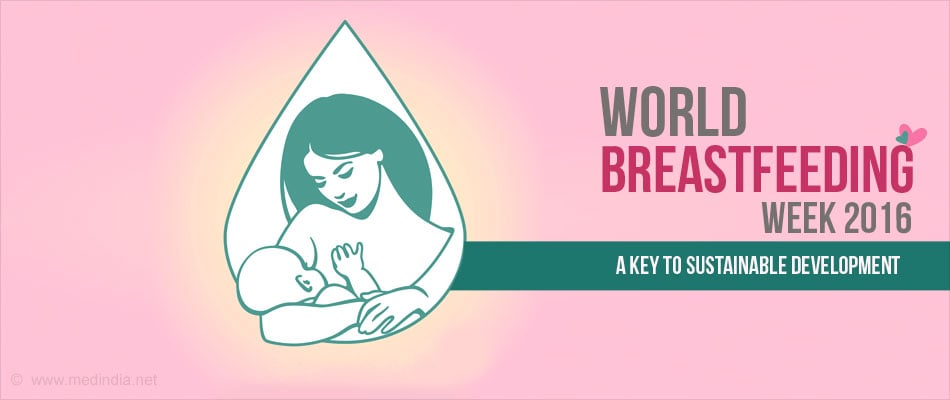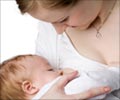
- The World Breastfeeding Week is celebrated every year during the first week of August across the world in order to encourage breastfeeding and improve the health of babies.
- It was first celebrated in 1992 by WABA (World Alliance for Breastfeeding Action) and is now observed by WHO, UNICEF and other organizing partners in around 120 countries across the world.
- This annual event emphasizes the value of breastfeeding for mothers as well as their babies. The World Health Organization and the American Academy of Pediatrics recommend exclusive breastfeeding for the first six months of life, followed by supplemented breastfeeding for a minimum of one year and up to two years or more.
- The theme of this year’s celebration is “Breastfeeding- A key to sustainable development”
The Importance of Breastfeeding:
The UNICEF World Breastfeeding Week 2016 Message highlights the importance of breastfeeding and how it is a key to sustainable development. Breastfeeding practices make the world healthier and smarter. Breastfeeding serves as a key factor that ends hunger, improves nutrition and promotes health and well-being. Each year, breastfeeding saves the lives of millions of children under the age of five.
Breastfeeding has numerous benefits for your baby - it has antibodies, which can protect him/her against infections and allergies. Breastfeeding decreases the risks of non-communicable diseases (such as childhood asthma and obesity) and promotes long-term health. It reduces risks for heart diseases and diabetes in later life. A longer duration of breastfeeding reduces the risk of breast and ovarian cancers in the mother.
Breastfeeding contributes to a healthy early childhood by supporting physical and cognitive development. Breastfed children are found to exhibit higher cognitive abilities, and possess high I.Q scores and better learning capabilities. All of these translate to higher rates of productivity and earnings in adult life.
Despite the evidences that breastfeeding benefits women, children and their communities, the rates of breastfeeding have remained stagnant for the last two decades. Many children have been missing out on this incredible boost to their health and too many women lack this information and support. By promoting, protecting and supporting breastfeeding, we can make better progress towards all our developmental goals. As the governments across the world frame their budgets and develop plans of action to achieve sustainable developmental goals, breastfeeding should be made a policy and be given utmost priority.
Breastfeeding Week 2016
This year, the slogan for the breastfeeding week is “Breastfeeding: A key to sustainable Development”. The theme being: Breastfeeding in relation to sustainability and to the sustainable development goals.
According to Dr Omer-Salim, the key writer for the World Breastfeeding Week 2016 Calendar Announcement, the term ‘Sustainable development’ stands for development that meets the present needs without compromising the abilities of the future generations to meet their own needs.
- Ending hunger, improving nutrition
- Ensuring health and promoting well-being
- Ensuring sustainable agricultural production
- Ensuring equitable education
The objectives of World Breastfeeding Week 2016 are:
- To inform the common people about the new Sustainable Development Goals and how they relate to breastfeeding.
- To firmly anchor breastfeeding as a significant part of sustainable development.
- To stimulate a wide range of actions at all levels on breastfeeding and infant and young child feeding.
- To collaborate and engage using a wider range of actors around the protection, promotion and support of breastfeeding.
- How breastfeeding acts a key element in getting us to value our well-being from the beginning of life
- How to respect each other
- How to care for the world we share with each other
- Wash your hands before feeding your baby, each time. And wash your nipples everyday with warm water. Avoid using soaps or lotion containing alcohol, which could dry your skin.
- Make sure your baby is latched on the right way and that the baby is sucking the right way. If the sucking hurts you, it might be because the position is incorrect.
- Let your nipples air dry between each feed. Let the milk on your nipples get dry.
- Change nursing positions whenever possible.
- Whenever your nipples get sore, rub some lanolin cream to soothe the pain.
- Stop using bra pads with plastic linings and make sure you change bra pads frequently to keep your nipples dry.
- Express milk till your let-down reflex to make sure that you have enough milk and so your baby sucks less hard too.
- Breastfeed often to prevent engorgement. It could make it tough for your baby to latch on.
- Have a well balanced diet with plenty of calcium. Include lots of fruits, vegetables, breads, meat, milk and dairy products.
- World Breastfeeding Week 2016 – Introduction - (http://worldbreastfeedingweek.org/)
- Breastfeeding Week Message - (http://waba.org.my/breastfeeding-a-key-to-sustainable-development-unicef-world-breastfeeding-week-2016-message/)
- Breastfeeding – Hints to Help You Get Off a Good Start - (http://familydoctor.org/familydoctor/en/pregnancy-newborns/caring-for-newborns/breastfeeding- formula/breastfeeding-hints-to-help-you-get-off-to-a-good-start.html)














